Luiz Felipe Scolari: How the Enigmatic 'Big Phil' Succeeded as Much as He Failed on the Big Stage

Luiz Felipe Scolari is number 33 in 90min's Top 50 Great Managers of All Time series. Follow the rest of the series over the course of the next seven weeks.
Never one for the middle ground, Luiz Felipe Scolari has delivered both great success and stupendous failure during his 37-year managerial career.
As a head coach, Scolari began his imposing the same no-nonsense style of football, for which he had become renowned for, as a defender in his playing days. He stuck with this style for some time, bringing him modest success at club sides in his home country and in Kuwait.
Luiz Felipe Scolari, Juventude#Juventude pic.twitter.com/kKoMhGJBI2
— Football Memories (@footballmemorys) June 23, 2016
It was at the beginning of the 1990s, where a return to management in Brazil sparked a small change in Big Phil's philosophy. No longer employing just an ugly style of play, the three Brazilians teams managed by Scolari in this decade were clinical in attack and garnered a team spirit matched by no other.
Early signs of the influence that religion had on his management style began to show, as Scolari insisted the changing room became a sacred place - a belief he drilled into his players. Clearly showing his preference for privacy, he also kept his squad sheltered from the media.
His tetchy relationship with the press would become a trademark of his career and the odd scuffle and heated argument with journalists after games were not uncommon.
Nevertheless, this formula worked a treat for 'Felipao', as he became known, as he won the Copa Libertadores with both Gremio and Palmeiras in 1995 and 1999 respectively.
Career Honours |
|---|
FIFA World Cup (2002) |
Campeonato Brasileiro Serie A (1995/96 & 2017/18) |
Copa do Brasil (1990/91, 1993/94, 1997/98 & 2011/12) |
Copa Libertadores (1994/95 & 1998/99) |
FIFA Confederations Cup (2013) |
Recopa Sudamericana (1995/96) |
AFC Champions League (2014/15) |
Chinese Super League (2014/15, 2015/16 & 2016/17) |
Chinese Super Cup (2015/16 & 2016/17) |
Uzbek League (2008/09) |
One month prior to the 2001 Copa America and with their hopes of World Cup qualification hanging by a thread, Brazil were in desperate need of a coach to reverse their fortunes and Scolari was the man they turned to.
However, the start of his time as Brazil manager didn't exactly go to plan. A shock 2-0 defeat to Honduras in the quarter-final of the Copa America left Big Phil's position as head coach on thin ice. Reacting in as simple terms as necessary, he said:
"I, Big Phil, will go down in history as the Brazil coach who lost to Honduras."
#OnThisDay in 2001: Honduras beat Brazil to eliminate them from Copa America quarter-finals – http://t.co/GLbXCo77p2 pic.twitter.com/QYM2WMqX7L
— FIFA (@FIFAcom) July 23, 2014
He came under intense scrutiny from the Brazilian press once again in 2002 after his shock omission of the popular Romario from his World Cup squad. The country was left in a state of shock as Scolari became 'public enemy number one'
The only suitable response to this would be leading Brazil to their fifth World Cup triumph.
And that's just what he did.
Scolari's meticulous tactical preparations coupled with his religion-inspired motivational techniques appeared to strike the right chord with his players and a 2-0 victory over Germany in the final saw Brazil crowned world champions for a fifth time.
"Pro-Zone stats in one hand, Bible in the other. Scolari is a throwback and a model of modern management, a mass of contradictions leading to tantrums and triumphs in equal measure."
Henry Winter on Luiz Felipe Scolari's unpredictable management style, via The Telegraph
After achieving eternal glory with Brazil, he stepped down as the national team coach, and three months later jumped ship to take the reins at Portugal, who were hoping he could win them their first international trophy at Euro 2004.
In an attempt to mirror the faith-led formula that had worked so well with Brazil, Scolari asked the Brazilian FA to borrow an image of Our Lady of Caravaggio, hoping the same divine inspiration would lead his new team to glory.
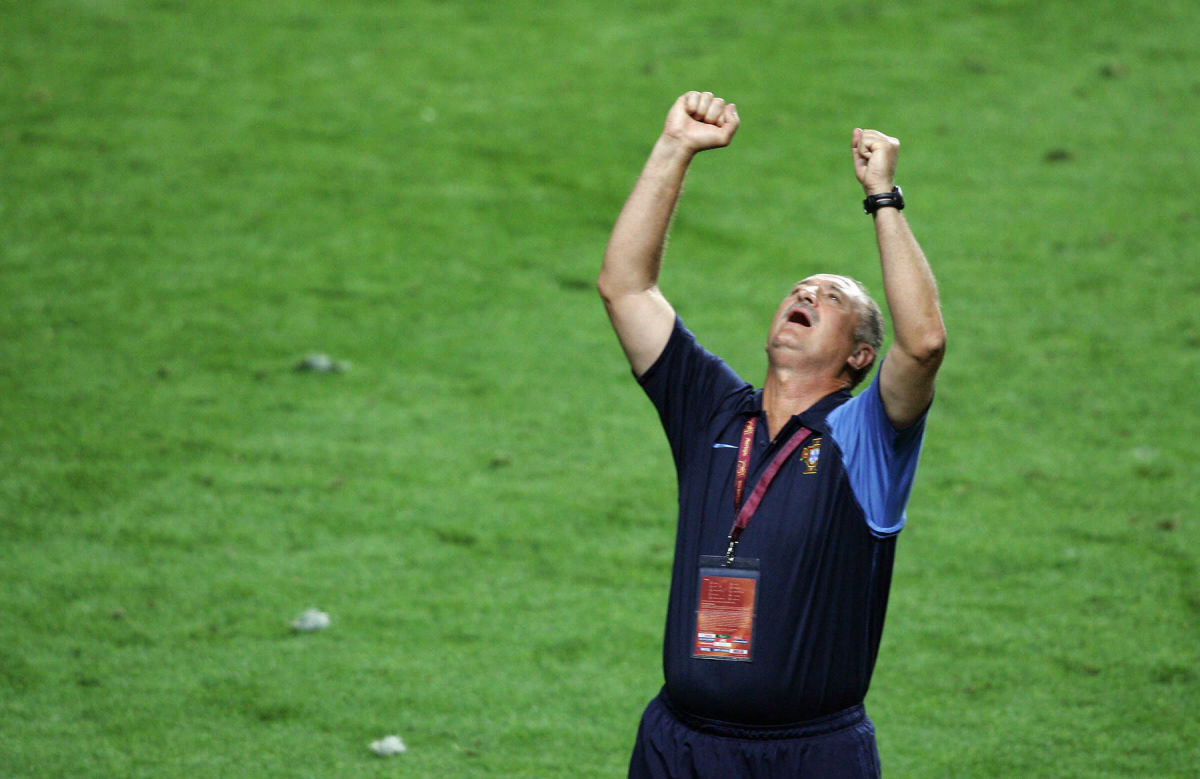
Like his Brazil tenure, things didn't exactly go to plan early on, as Portugal suffered a shock defeat to Greece in the Euro 2004 opener. But, Portugal - as Brazil did - bounced back, making it all the way the final of the competition, where they would meet the Greeks once again.
Alas Angelos Charisteas, whose entire footballing career seemed only to span the length of this tournament, broke Portuguese hearts in the final, as his second-half goal was enough for Greece to pull off the most unlikely of upsets.
ON THIS DAY in 2004: 80/1 outsiders Greece stun Portugal 1-0 to claim the European Championship title #football pic.twitter.com/QPihUGsXfG
— FOX SPORTS News (@FOXSportsNews) July 4, 2015
Despite this defeat, Scolari's achievements with Brazil and Portugal had made him one of the hottest managerial properties in world football, and ahead of the 2006 World Cup, with Sven Goran-Eriksson's reign as Three Lions boss coming to an end, the English FA did what every major footballing nation desperate for success in the early 2000s did: they went after Luiz Felipe Scolari.
Their attempts to lure the Brazilian to the England job after the World Cup were ultimately unsuccessful, as Scolari expressed his discontent at the intense media attention he was subjected to as he discussed the move. In a statement which followed, he said:
"There are 20 reporters outside my house now. I don't want this situation involving England because in two days during which I was not coach, I never agreed to anything, my life was invaded. My privacy was totally under siege."
Teams Managed | Years |
|---|---|
Alagoano | 1982 |
Juventude | 1982-83 & 1986-87 |
Xavante | 1983 |
Al-Shabab | 1984-85 |
Pelotas | 1986 |
Gremio | 1987, 1993-96 & 2014-15 |
Goias | 1988 |
Al Qadisiya | 1988-90 & 1992 |
Kuwait | 1990 |
Coritiba | 1990 |
Criciuma | 1991 |
Al-Ahli | 1991 |
Jubilo Iwata | 1997 |
Palmeiras | 1998-00 |
Cruzeiro | 2000-01 |
Brazil | 2001-02 & 2012-14 |
Portugal | 2003-08 |
Chelsea | 2008-09 |
Bunyodkor | 2009-10 |
Guangzhou Evergrande | 2015-17 |
Scolari would later extend his contract with Portugal, but only after dumping England out at the quarter-final stage on penalties for the second tournament running in 2006. They eventually lost to France in the semis with Scolari unable to repeat past success.
Going one worse than before, the quarter-finals proved the final hurdle for Scolari's Portugal at Euro 2008, as they lost 3-2 to Germany in a classic encounter. This game would also prove to be Big Phil's last as Portugal's manager.
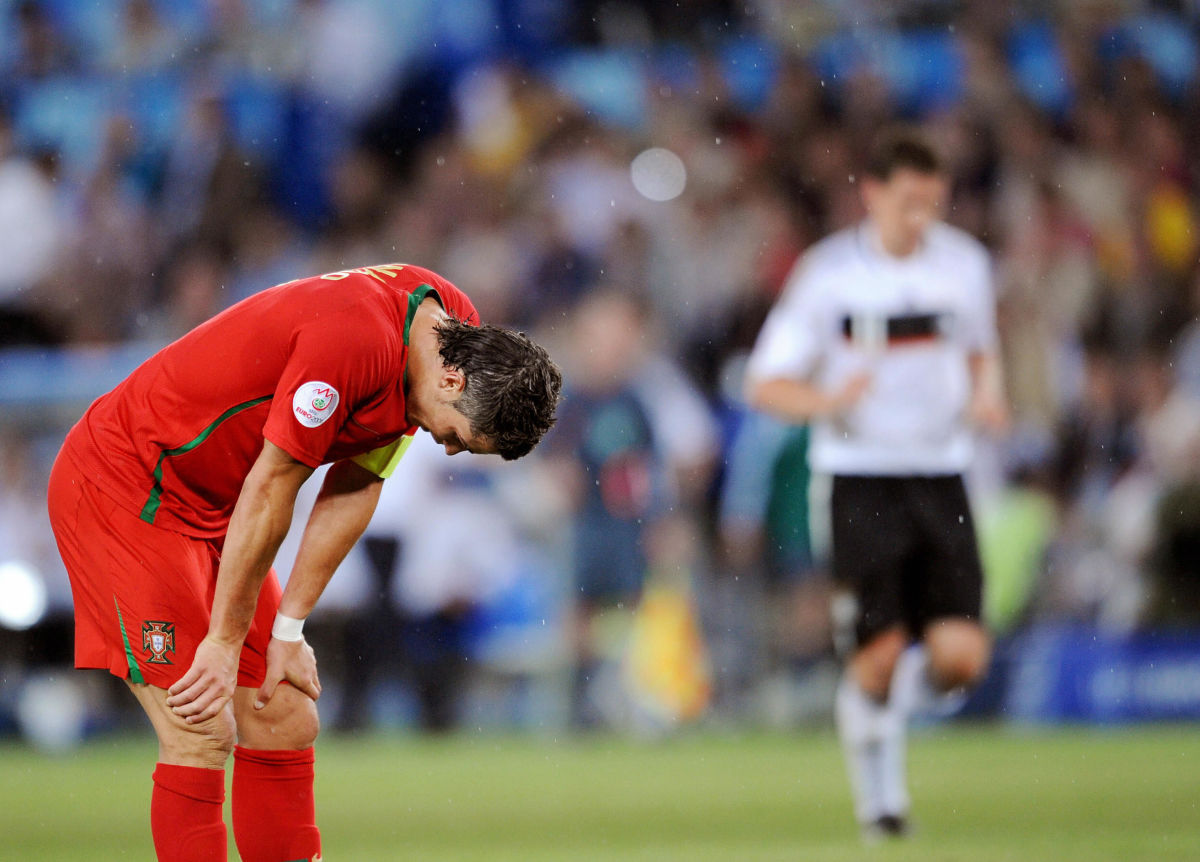
Following the tournament, Big Phil finally made the move to English football, but rather than the national team, he took over at Premier League side Chelsea.
This proved to be an ill-advised move in his career, as the Blues' star-studded team never bought into Scolari's methods and did not take well to his unpredictability.
After suffering a fairly torrid six months in charge, the Brazilian was relieved of his duties and replaced by the infinitely more popular Guus Hiddink.
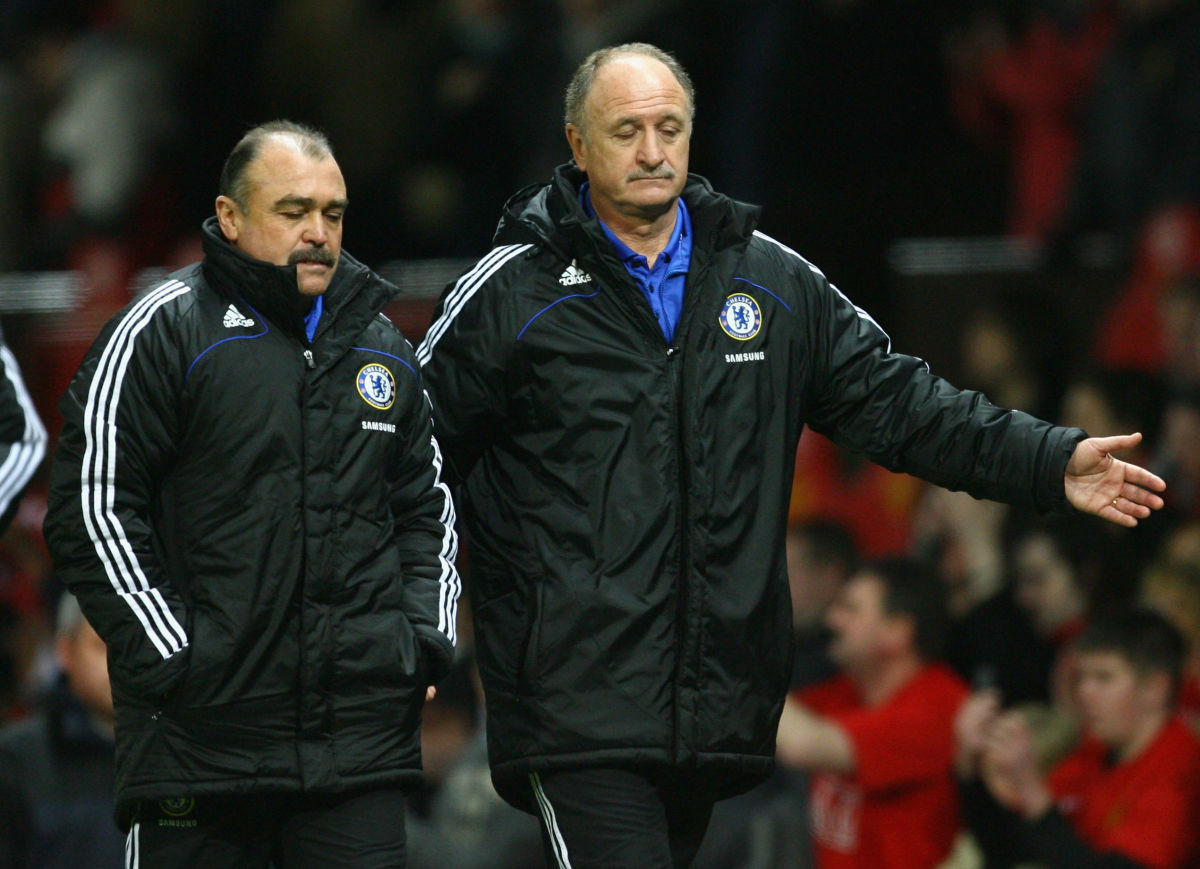
Aged 60 at the time of his sacking, it was thought that Scolari had only one major job left in him. And who else could that have been than with Brazil?
His career would come to be defined by this second stint as Brazil coach. Hired in 2012, the 64 year-old was tasked with ending an agonising 12-year wait for a sixth World Cup and to do so in his home country.
Brazil would be hosting the tournament for only the second time. On the previous occasion in 1950, Flavio Costa's side gave away a one goal lead to lose 2-1 to Uruguay in the final. A defeat the country had never fully recovered from and it would be this PTSD that would be the undoing of Brazil in 2014.
Going into the tournament as strong favourites, they looked steady in the group stages. They overcame a scare against Chile in the second round, and beat Colombia in the quarters to set up a semi-final with Germany.
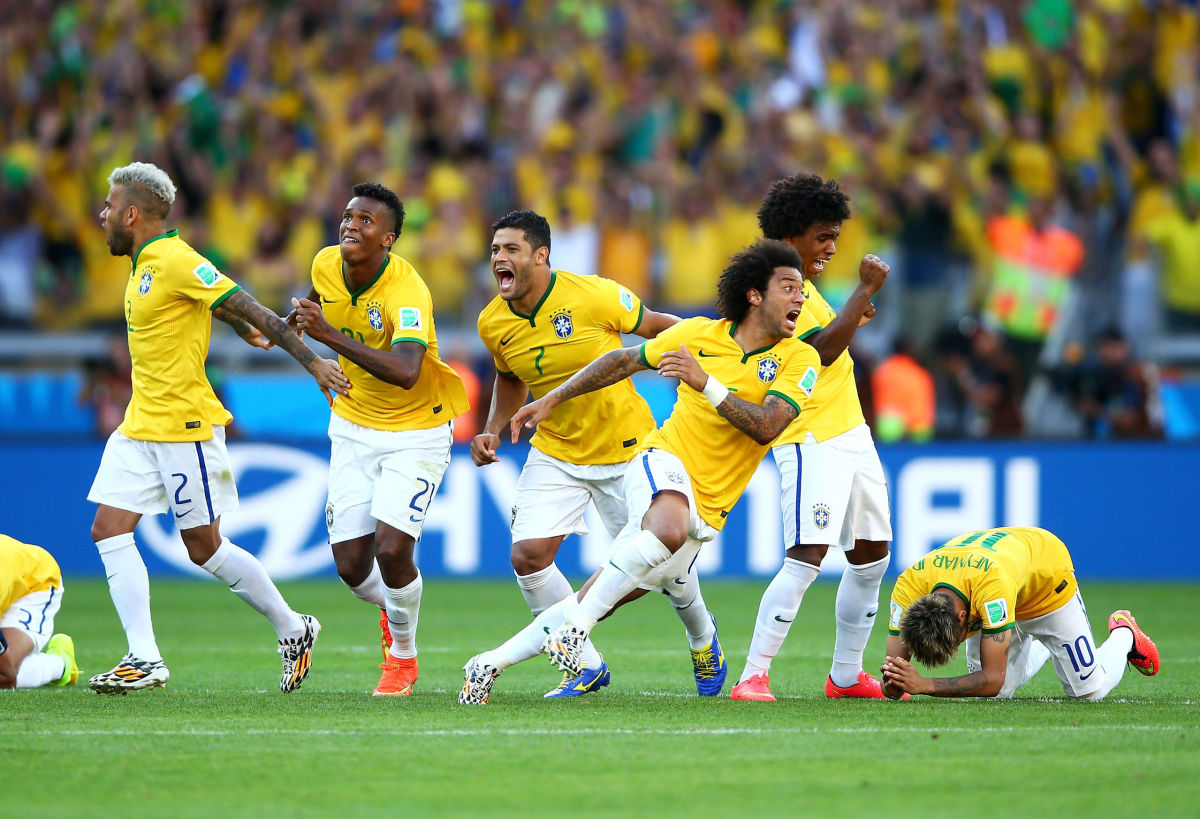
However, in doing so, they lost Thiago Silva through suspension and Neymar suffered a horrific injury, as he narrowly avoided paralysis after Juan Camilo Zuniga collided with his lower back.
It was an uphill task, but with the weight of a nation behind them, anything was possible.
Sadly for Brazil, anything was actually possible.
A first-half capitulation saw Germany score four goals in six minutes, as they romped to a historic 7-1 victory.
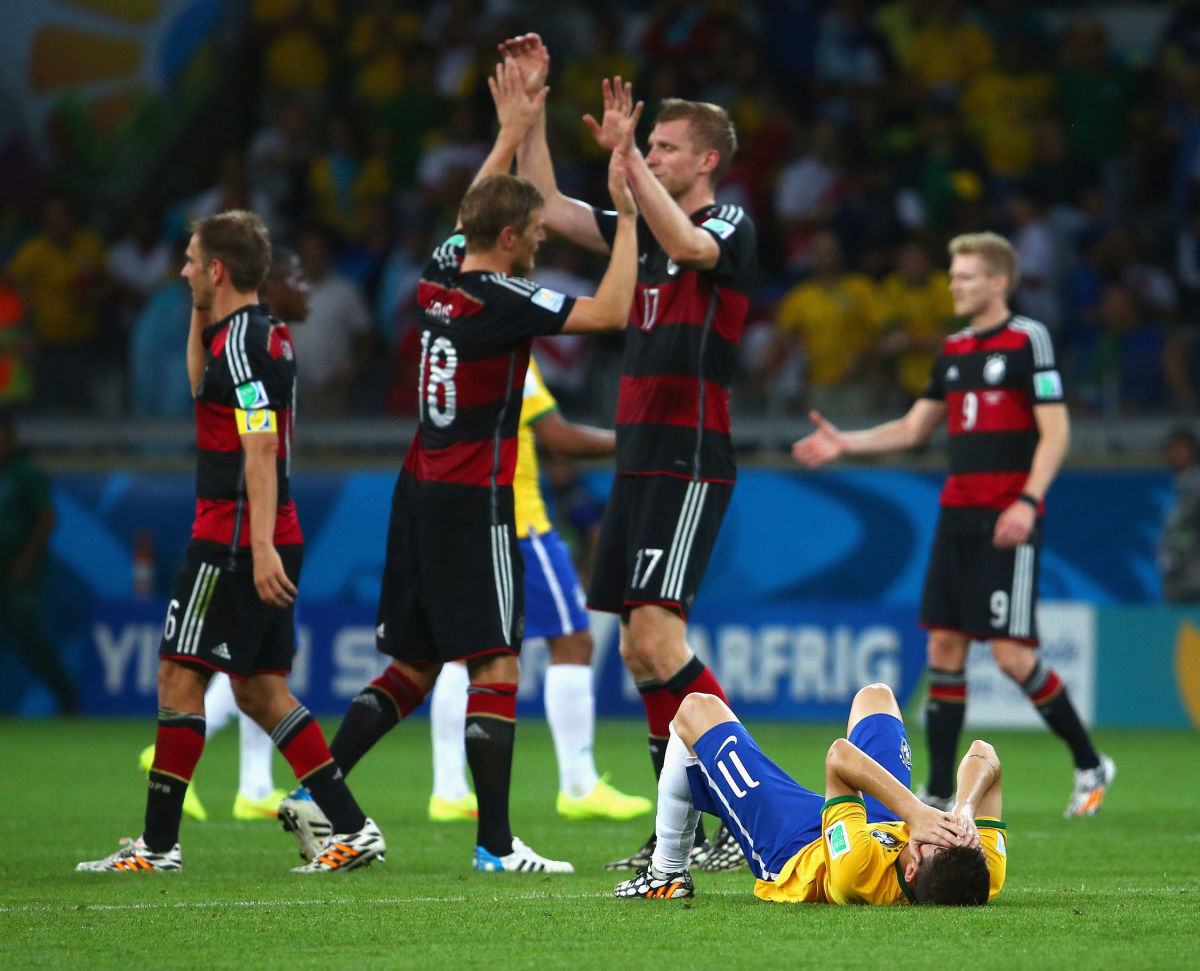
Having found such a perfect balance between passion and tactical preparation in his victorious 2002 World Cup campaign, Scolari seemed to rely too heavily on the emotional side of the game in 2014, which became the primary cause of their catastrophic break down.
When stand-in captain David Luiz, while fighting back tears, held the shirt of Neymar aloft just before this game, it was clear to see Brazil were not in the right frame of mind.
"Rather than make a real plan, they abandoned themselves to romantic notions of passion and desire"
Ken Early on Why Brazil Lost, viaSlate
If 2014's World Cup was a chance for Brazil to right the wrongs of 1950, whenever they next host the tournament, it is surely this game that will be looked upon as the one which needs to be atoned for.
Despite all the glory he has achieved, and continues to achieve, as a manager, Scolari may never get over this defeat.
For he, Big Phil, will go down in history as the Brazil coach who lost 7-1 to Germany in the semi-final of a home World Cup; a defeat so catastrophic, that it may eternally shroud all of his incredible achievements in the game.
Number 50: Marcelo Bielsa - El Loco's Journey From Argentina to Footballing Immortality in Europe
Number 49: Vic Buckingham - How an Englishman Discovered Johan Cruyff & Pioneered Total Football
Number 48: Claudio Ranieri: A Ridiculed Tinkerman Who Masterminded One of Football's Greatest Ever Achievements
Number 47: Bill Nicholson: Mr Tottenham Hotspur, the First Double Winning Manager of the 20th Century
Number 46: Sven-Goran Eriksson: The Scudetto Winning Shagger Who Never Solved the Lampard-Gerrard Conundrum
Number 45: Sir Alf Ramsey: The Man Behind the 'Wingless Wonders' & England's Sole World Cup Triumph
Number 44: Antonio Conte: An Astute Tactician Whose Perfectionist Philosophy Reinvented the 3-5-2 Wheel
Number 43: Kenny Dalglish: The Beacon of Light in Liverpool's Darkest Hour
Number 42: Massimiliano Allegri: The Masterful Tactician Who Won Serie A Five Times in a Row
Number 41: Sir Bobby Robson: A Footballing Colossus Whose Fighting Spirit Ensured an Immortal Legacy
Number 40: Luis Aragones: Spain's Most Important Manager, the Atleti Rock and the Modern Father of Tiki-Taka
Number 39: Herbert Chapman: One of Football's Great Innovators & Mastermind Behind the 'W-M' Formation
Number 38: Carlos Alberto Parreira: The International Specialist Who Never Shied Away From a Challenge
Number 37: Franz Beckenbauer: The German Giant Whose Playing Career Overshadowed His Managerial Genius
Number 36: Viktor Maslov: Soviet Pioneer of the 4-4-2 & the Innovator of Pressing
Number 35: Rafa Benitez: The Conquerer of La Liga Who Masterminded That Comeback in Istanbul
Number 34: Zinedine Zidane: Cataloguing the Frenchman's Transition From Midfield Magician to Managerial Maestro
